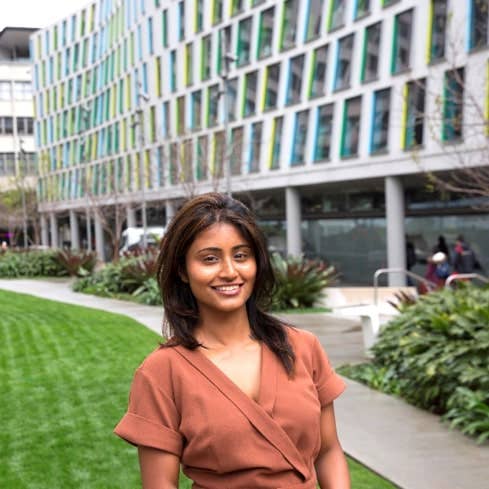Erandhi Liyanage
My name is Erandhi Liyanage. I am from Sri Lanka and grew up in the capital Colombo. I currently work for the Kolling Institute of Medical Research as a Research Assistant. My research team is focussed on neurogenetics. Our research is backed by a large philanthropic grant.
I finished a Diploma of Science at UTS College in 2012 and then completed a Bachelor of Biomedical Science at the University of Technology Sydney (UTS) in 2014. I was also awarded the prize for academic excellence by UTS College 2012. I really liked the transition from the diploma to the degree because I was able to go straight into second year and I was doing the same course work as first year students who went directly to UTS.
My role is very dynamic, I get to do some independent projects on a current disease “Hereditary spastic paraplegia” that we are currently testing a clinical trail on as well as support my team. I run some of the clinical tests that the Kolling Institute’s clinical trials and test our samples and do ribonucleic acid (RNA) extractions to see if certain genes are being expressed. I also get to coordinate our team and ensure that ethics protocols are up to date. I only started this role recently because I knew the head of the team and came to work with them.
I really love training students because everyone is different and some people are really good at project management whereas others are better at lab work and it’s about bringing out the best in everyone and their unique skills. For me, I like science communication – communicating in clear terms what the biomedical sciences entail, why it should be funded, what the implications of our research. I really like presenting at seminars and conferences. Showing what we are doing is the best part. It is very rewarding to make people understand and passionate about scientific research.
It is interesting to compare what motivated me at high school compared to now. When I was younger I wanted to make a difference. Now what motivates me it is to do something completely different and challenge myself every day. I am also motivated by working with lots of passionate, like-minded people. From the pathology staff to the clinicians, I always feel like I have a reason to get up every day. I know most people are not in such a fortunate position. Doing research science is a tough area – you have to fight for a very small pie of funding but the staff always are committed.
When I studied at UTS I noticed that everyone was really friendly. I would often to run into my lecturers from first year at the library when I went to UTS. There is very good teacher and student interaction. I also joined the Student Activities Club so I could volunteer. At UTS, I was a student representative and worked for 20 hours which was the allowance I received on my visa at the time.
At UTS College and UTS, you can easily build friendships. Everyone is friendly at UTS. It’s a good stepping stone to see how the work environment’s going to be. I feel like they made me realise that life is not just about marks. The main thing is your determination and motivation. I now do not really mind that I do not know what I am going to do next year, let alone in five years’ time. I feel like I learned to love the process in life and work and not put too much emphasis on the outcome, over which I have little control.
When I was younger I would have described UTS as high quality because of the rankings as well as industry focussed and community driven. Sometimes with other universities, there is a lot more elitism which I find off-putting. I was able to be part of a community at UTS. Also some of the lecturers were really inspiring and you always wanted to talk to them and some I still talk to. I like the modern approach they have to delivering education and producing graduates which are ready to work. You do not always have this focus at the more traditional sandstone universities. Even the small details make the greatest difference – I really liked the online lectures.
I feel like other universities produce graduates which can spout theory but are not work ready. At the end of the day, the role of the university is not just to teach knowledge for its own sake. It is to produce well-rounded people who can apply their learnings to the workplace.
Don’t limit yourself to a certain way, always learn to step outside your comfort zone. It might seem scary, you might miss your family and not everyone will support you. If your passionate about something and your willing to work hard for it, take that challenge of going overseas to study, you will meet life long friends and opportunities.
